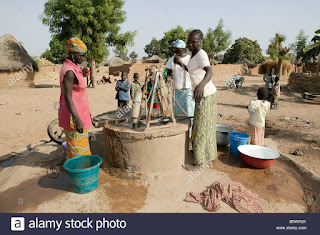Introduction: Water
and Gender in Africa
 By searching gender and water in Africa on Google, one of
the first thing that popped up was a startling revelation where ‘’Over 17 million
women and girls collect water in Africa, at risk of rape and disease’’ an article
by Reuters. Just by typing this into a search engine, one would get a large influx
of articles, policy papers, institutions such as the UN and charities like
WaterAid and UNICEF who all place a large emphasis on development issues
surrounding women and water in Africa. Thus, being a geographer, it is vital to
explore they ways in which gender contributes to water development in Africa,
the issues surrounding women and water and how we can combat such issues. Thus,
this is evidence of significant development issues surrounding gender and water
development in Africa, just like the one in the articles headline.
By searching gender and water in Africa on Google, one of
the first thing that popped up was a startling revelation where ‘’Over 17 million
women and girls collect water in Africa, at risk of rape and disease’’ an article
by Reuters. Just by typing this into a search engine, one would get a large influx
of articles, policy papers, institutions such as the UN and charities like
WaterAid and UNICEF who all place a large emphasis on development issues
surrounding women and water in Africa. Thus, being a geographer, it is vital to
explore they ways in which gender contributes to water development in Africa,
the issues surrounding women and water and how we can combat such issues. Thus,
this is evidence of significant development issues surrounding gender and water
development in Africa, just like the one in the articles headline.
Role of men and women
in Africa
When I think about gender and water in Africa the first
thing that pops in my mind is the image of women and children collecting water
(like the one above), however is gender always just about women? Yes, majority
of the time women are the key focus of study and noticeably they are the traditional
water managers, spending much of their time and energy on water collection to
ensure a healthy maintenance of their families through domestic water use, and
inevitably most research, articles and development projects will be around
women collecting water and the surrounding issues. However, men are also seen
as managers of water; through the control of water to irrigate their agriculture
and management of irrigation system. Here is a video on the drip irrigation in
Africa which are built and managed by men.

Thus,
gender plays a crucial role in the accessibility and management of water in
Africa, however there should be more cross overs in the roles and responsibilities
between men and women. Although some women have served on local water
management committees, often they play very limited roles, having a limited
chance to voice their concerns. This can be discussed in my upcoming blogs, so
stay tuned!
This blogpost is a good, personal start. To start your engagement with the peer-reviewed literature move beyond Google and consult not only the reading list for Water & Development in Africa but also academic search engines for references. What happened to more recent posts?!
ReplyDeleteHi!
ReplyDeleteLoved reading this first blog it was very clear and an enjoyable read. I found it interesting how you referred to women as 'traditional managers of water' and men as 'managers of water' for irrigation systems. I don't know about you but when I try and imagine a 'manager' it is almost always a male figure...I think this highlights well that 'manager' is a hierarchical position due to the power it poses. Which shows that regardless of wether women 'traditionally' collect water, men will always hold the power over such a powerful resource - creating implications for the whole of society.
Can't wait to read more!
Hi Elizabeth! I totally agree with you, the connotations around ''managers'' always points towards a male figure, thats why it is important to analyse the role of women when it comes to societal demands, including water because essentially they play a large role but their input always seems to go underrated both within their local context and amongst themselves sometimes too.
DeleteA nice introduction to the main areas you want to focus on with regards to water and gender. I like how you have challenged what is perceived as gender. Where you able to find any academics who follow a similar 'train of thought'? what are their theories on why people typically focus on women in Africa? I look forward to your future posts, I am sure there will be a interesting schools of thought (theories), research and cultural practises for you to explore.
ReplyDelete